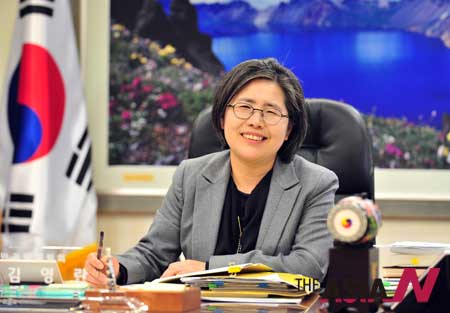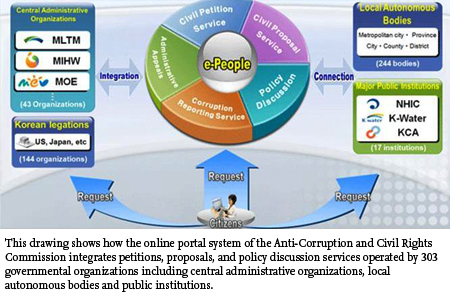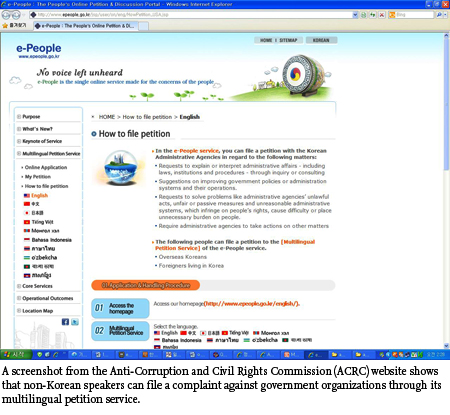ACRC’s outreach program in full swing

Kim Young-ran, chairperson of the Anti-Corruption and Civil Rights Commission (ACRC), smiles as she talks about the importance of the government-run agency’s efforts to outreach the public and further achieve transparency at her office in Seoul. / Courtesy of the ACRC
Making Korea a warm-hearted, transparent country is the motto of the state-run anti-corruption commission.
The endeavors and achievements of the Anti-Corruption and Civil Rights Commission (ACRC) are as truly remarkable as praised by the United Nations and other goodwill international organizations.
However, Kim Young-ran, chairperson of the ACRC, says many of the vulnerable and marginalized people, including multiracial families, still find themselves frustrated by complicated procedures when confronted by injustice and unrighteousness.
She points out that ordinary people have yet to feel much improvement in the government’s efforts to better serve them as their expectations grow and administrative processes often become even more complicated to reflect the rapid change in society.
“In order for us to be a better advocate, we need to be a better listener,” Kim said, stressing that the ACRC should put its top priority on expanding its communications channels for those in need of help.
Multilingual service
As a part of her ongoing efforts to create an easier, one-stop service in protecting the rights of foreigners here, the ACRC has been expanding its multilingual petition service through its online petition site, www.epeople.go.kr.
It allows non-Korean speakers to file petitions and corruption reports as well as make policy suggestions and administrative appeals to Korean government institutions in 10 foreign languages, including English, Chinese, Japanese and Vietnamese.
The ACRC will expand the service, which helps it analyze complaints in a systematic manner to better reflect them in improving government polices and institutions, as the foreign population continues to grow.
Currently, it provides all languages used by foreign nationals of 10,000 or more residing in Korea.
Thus far, some 2,400 complaints have been received through the multilingual service.
Kim has also been active not only in protecting the rights of migrants here but also in protecting the rights of Korean national abroad.
She has sought help from foreign governments and civil rights organizations to allow Korean nationals working or living in their countries to file petitions in the Korean language.
With the cooperation of the Indonesian government, Korean nationals can now file petitions in Korean to the Indonesian government through www.epeople.go.kr, instead of having to visit relevant government ministries of the South Asian country.
The ACRC has signed a memorandum of understanding with Thailand and Kyrgyzstan to create a petition system that lets Korean nationals abroad file complaints in their own language.
She envisions launching the Global e-Petition System, where foreigners can directly file a complaint to or against a foreign government without language barriers.
Earlier this month at the 14th Annual Meeting of the Asian Ombudsman Association Board of Directors in Baku, Azerbaijan, Kim proposed launching a multilingual e-petition system in which members nations participate to better serve the foreign population in their country.
Who is Kim Young-ran?
Kim Young-ran, 55, has served as chairperson of the Anti-Corruption and Civil Rights Commission of Korea (ACRC) since January 2011.
She passed the bar exam in 1978 and served as a judge for 30 years until she retired in 2010.
She was appointed in 2004 as the first female justice at the Supreme Court of Korea at the young age of 47.
Kim has earned great respect for her lifelong endeavors to improve the rights of minorities and socially vulnerable groups while serving as a justice at the top court for six years.
She is married to Kang Jiwon, a renowned lawyer and cofounder of the Korea Manifesto Center, a non-profit organization promoting a fair and transparent political election culture. <The Korea Times/Lee Tae-hoon>



























































